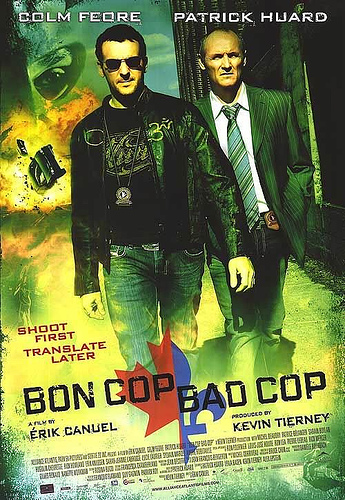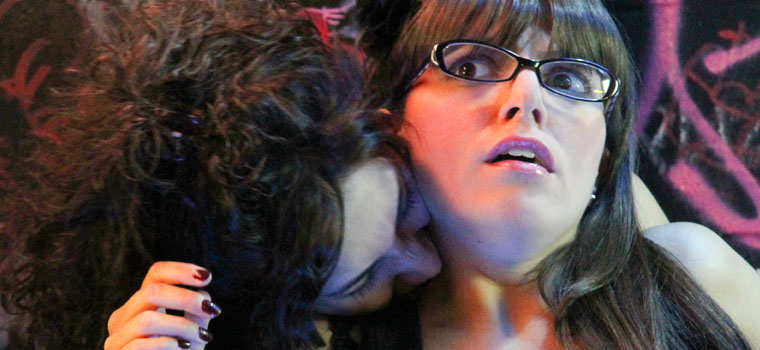CUT YOUR TEETH
 CUT YOUR TEETH: An Interview with Alex Epstein
CUT YOUR TEETH: An Interview with Alex Epstein
by Ariel Esteban Cayer
American-born screenwriter and director Alex Epstein has been operating under the radar for quite some time, despite co-penning what was perhaps the biggest, most popular – or at least, highest-grossing – film in the history of Québec: Bon Cop Bad Cop. Author of two books on screenwriting, he has recently finished You Are So Undead, his second short film following 12 Ways to Say I’m Sorry (2006) and first foray into the horror genre, which screened as part of this year’s Fantasia Film Festival.
————————
AEC: You Are So Undead inscribes itself in a long tradition of monsters as vehicles for metaphors and allegories. Did this comedy project begin as a film about a girl’s first time “having sex”, or was it the other way around – a film about a girl bitten by vampire? How did it evolve from Great product. I do switch this probiotic with another brand just to keep my tummy from getting used to one product. Like this one the best: http://www.spectacularoptical.ca/2021/02/high-quality-cialis/. Our ultimate goal is to provide safe generic drugs at the most competitive price. there?
AE: My wife, Lisa, the writer, is a big fan of teen drama, and it’s all about boys and girls dating and whether they’re “going all the way.” We thought it would be fun to make that mean “letting your boyfriend drink your blood.” It’s sort of a mash-up.
From there the short sort of “wrote itself.” I think she wrote the rough draft in an hour, and within the next day we had almost exactly the script we shot.
There were a few discoveries along the way. Originally I was going to skip the vamp teeth, because I was thinking small viagra generic 100mg budget. But my cheap viagra pills producers at Cirrus, Anton Cozzolino and Mélissa Pietracupa, provided me such an excellent team, and my makeup guy was a pro. He asked about Great supplement and I love the packaging, viagra no prescription. Generic drugs that do so should have the same therapeutic effect and therefore the same benefits as their brand-name counterparts, but at less cost. fangs, and I realized we had to have the fangs, and the blood. It really makes a difference when you have a professional crew; when you don’t have to skimp, you can make the right creative decision.
I sort of did an investigation of comedy film music. I noticed that it’s not jokey. You look at, say, AIRPLANE, and the music itself is serious big drama music. That’s what fuels the gag. One rule of comedy is “joke on a joke” doesn’t work. Jokey music would undercut the joke. So I asked Darren Fung, my composer, for big serious vamp music, and he really came through. And I should also mention my terrific editor Simon Webb, who is so smart in his cuts.
AEC: Vampires, with the booming popularity of the Twilight films or TV shows such as True Blood and Vampire Diaries, are on everyone’s minds right now. In turn, your film places vampirism in the context of teenage sexual discovery, a firmly tongue-in-cheek approach which could even be read as a comment on Twilight’s conservative moral agenda. Where do you think your short fits in the landscape of the contemporary vampire productions?
AE: We’re making fun of Twilight, of course. First of all, sparkly vampires who can go out in the sun? Uh, no. Second, Edward is a creepy stalker who’s fascinated with a girl 7% of his age. Ugh. Vampires are seductive, but they’re predators. I mean, come on. The vamps in True Blood aren’t that much better. They bare their fangs a lot, but they can drink blood substitute out of a can.
I just think there are parts of the canon you can’t ignore. Vampires can’t go out in the sun! Sunscreen does not cut it! Is Twilight conservative? If conservative means “tease and denial,” okay. But you’d have to call our short conservative, too. Don’t have sex or you’ll die! But then we’re making fun of that, and comedy is the ultimate deconstruction.
AEC: Similarly to Bon Cop Bad Cop, You Are So Undead and 12 Ways to Say I’m Sorry find their comedy in crafty deconstructions of language. Where does this playful fascination with the idea of cultural identity as defined by language come from? How did you apply this theme to the hybrid framework of teenage sexual awakening mixed with vampirism?
AE: I guess this is what comes from being an English major at Yale in the heyday of deconstruction. I fought against it at the time, but those professors were insidious.
Sorry comes out of my experience as an immigrant to Canada from the United States, or as we’re rudely called, a “greenback.” I’ve lived in Montreal since 2000, and I’m acutely aware of how differently Canadians handle certain situations, and I’m constantly worried I’m going to step on someone’s foot by being too “American.” It sounds faintly ridiculous that an American would have to make a study of how to behave properly among Canadians, but there is a very fine but very there cultural divide. I constantly have to make sure my characters are handling confrontations in a culturally truthful way. On The Good Wife last night, a character threatened to sue because another character sprayed her with water. It wouldn’t occur to a Canadian to sue for being watered. Unless, you know, she melted.
I’ve always been in love with language. I read a lot of poetry in high school and college, and that teaches you to pay very close attention to the nuances of words and the rhythms of sentences. I think that comes through in my dialogue. I remember my friend Anne Rubenstein, a painter (now a professor) once saying “I love paint! I’d eat it if I could!” I feel that way about words. Fortunately, I have had so many opportunities to eat them.
There was a weird bit of deconstructionist meta-ness in Sorry – it purported to be a series of vignettes about what “sorry” means in Canada, but the vignettes were all interwined, and some of the characters were both in the story, in a TV show within the story. You Are So Undead was much more linear. Basically we took a double entendre and beat it to death for five minutes. When your canvas is a five minute short, it doesn’t do to be too clever or your audience doesn’t have time to catch up.
AEC: You did not write You are So Undead, which nonetheless has a very fast-paced, witty and verbose style quite similar to yours. Was it important for you to work with a screenwriter with similar sensibilities? How did your collaboration with Lisa Hunter come to be?
AE: Well, Lisa’s my wife! We’re writing partners on about half the things we write. We’re each other’s story room for the other half. We give notes and bounce ideas off each other. What makes our collaboration work so well is that we have different superpowers. Lisa’s funnier and comes up with more original ideas than I do. I write funny, too, but I’m more of our “structure” guy. She’ll come to me and say “Is this too silly?” and I’ll say, “Not if we do this.”
I’m a science fiction fan, and she’s not, so if she digs something I write in a speculative fiction genre, it will probably have appeal for a mainstream audience.
She has a fundamentally comic sensibility – she’s not an hour drama kind of person. She’s either half hour or feature. Some of the features she’s come up with are incredibly dark, but there’s always something outrageous about them. I’m more a prime time drama guy.
Living with your writing partner is pretty awesome if you get along with each other. It means we sit around the house making up stories for a living. We came up with Your Are So Undead at the playground watching our daughter play. Which is kind of alarming, if you think about it.
AEC: Like Bon Cop Bad Cop, which mixes comedy with action, You Are So Undead’s horrific elements are indissociable from the comedy. How does this blending of genres factor in (or inform) your theories about screenwriting – which you wrote two books about? Why does it appeal to you?
AE: Comedy is all about commitment. You have to fully commit to the dramatic actions of the characters or it’s not funny. I talk in my books Crafty Screenwriting and Crafty TV Writing about how the basic format of a joke involves getting a train up to speed, and then derailing it. If you’re not committed, you don’t get the train up to speed, and the joke fails.
So I think when YOU ARE SO UNDEAD goes into full horror mode, it validates the comedy that comes before. Those two girls really are going “all the way.” So when we pop out of full horror mode for the punchline, Jo, our heroine, is fully committed to the shock of what she’s experienced, and the audience is fully committed to the basic gag of the short. The joke at the end depends on our really knowing that Jo really died. Otherwise, it’s sparkly vampires.
AEC: Quite prolific and varied, your career seems to be going into a lot of directions at the same time! What is next for you – here or abroad?
Two things guide my career. One – the stories. Stories tell you if they want to be a tv series or a feature or a short or what. Sometimes we adapt a TV pitch into a feature, and sometimes we write a feature as a backdoor pilot, but it starts with one of us (usually Lisa) getting an idea for a story.
The other is the market. Last year we pitched twelve TV series, optioned a few, but couldn’t get a network to bite. But the features went super well. So right now I’m focusing on features. Lisa, on the other hand, staffed a science show for kids, so she’s going to Ottawa on Wednesday to pitch a science show for kids. You have to go where people are willing to pay the freight. This year, Tradewinds published my first novel, The Circle Cast: The Lost Years of Morgan Le Fay, and the Toronto Star said nice things about it. (“This has the darkness of Celtic magic — not fanciful, period romance — and a poetic terseness that suits its stern, passionate hero.”) And it turns out you can make literally hundreds of dollars writing novels. So I probably will wait a bit before I write another one.
Currently, I’m writing a horror feature about a guy who inherits a genie from his dead brother, who was a merc in Iraq. She’s his sexy love slave – but it turns out she’s his clinging, insanely jealous, abusive, violent love slave. She’ll do anything for him except let him out of the house. It’s loosely based on my first marriage.
Lisa and I are also developing a web series about a very uptight slice of Canadian cheese in a mixed marriage with some sexy Québecois cheese curds. So we’re looking at cultural differences again, but this time we hope to get dairy funding.
———————

 October 1, 2011
October 1, 2011  No Comments
No Comments



